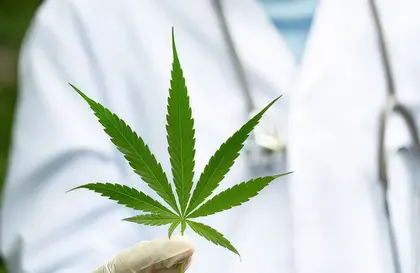In the second reading, the Verkhovna Rada voted in favor of legalizing medical cannabis in Ukraine, passing the new law with a total of 248 votes, as reported by People’s Deputy Yaroslav Zheleznyak on Telegram.
The Servant of the People pro-presidential faction cast 178 votes in support of the bill, draft law No. 7457. However, the European Solidarity faction, led by former President Petro Poroshenko, and the Batkivshchyna faction, led by former Prime Minister Yulia Tymoshenko, did not support the document.
JOIN US ON TELEGRAM
Follow our coverage of the war on the @Kyivpost_official.
Zheleznyak clarified, “The law comes into effect six months after its publication. Therefore, it is expected to take effect in the second half of 2024.”
During this period, the Ukrainian government is tasked with developing all necessary by-laws and orders to ensure the effective implementation of the new law.
The initial bill was adopted as a basis by 268 votes in July, with lawmakers submitting over 800 amendments since then.
Ukraine’s Health Ministry and the World Health Organization estimate that up to seven million people in Ukraine may require cannabis-based medications, including military servicepersons with PTSD symptoms, civilians experiencing pain, and patients with cancer and epilepsy.
Cannabis-based drugs have various medical applications, such as reducing pain, muscle spasms, and cramps, treating anorexia, PTSD, and anxiety disorders. Additionally, they are used to alleviate pain and suffering in seriously ill and palliative patients, including those with cancer and HIV.

Brussels Hopes to Advance Ukraine, Moldova Entry Talks in 2025
What does the adopted bill offer?
Mykhailo Radutsky, chairman of the Standing Committee on National Health, Medical Aid, and Medical Insurance, earlier explained to Kyiv Post the main points of the bill.
The legislation will compel the government to move medical cannabis from List 1 (drugs not permitted for circulation) to List 2 (permitted under strict control). The Agrarian Policy Ministry will maintain a register of legal entities involved in the cultivation and processing of industrial hemp, accessible to the National Police.
Laboratory control of THC (tetrahydrocannabinol) will be exclusively conducted at specialized laboratories of the Interior and Justice Ministries, the Security Service, the State Border Service, and the State Medicine Service.
The document allows for the import of raw materials, ensuring that patients do not have to endure lengthy waits but can promptly access necessary medications in pharmacies.
Medical cannabis will be exclusively available through electronic prescription, with no over-the-counter sales permitted. Patients will have the ability to carry, transport, and store cannabis medicines according to the cases outlined in the medical prescription and the specified quantity per prescription.
The approved bill explicitly prohibits recreational cannabis, limiting its use solely for medicinal purposes.
As per the draft law, medicines derived from medical cannabis fall under the legislation governing medicinal products. Therefore, the certification process for drugs produced from medical cannabis aligns with the standards applied to other medicinal products sourced from plant raw materials.
Radutsky said that the bill grants full authority to the National Police to control the circulation of medical cannabis, stating, “Let me stress again: it’s exclusively about cannabis-based medications that will be grown, produced, and used under the strict control of the National Police.”
The document also eliminates Soviet-era restrictions on the production of technical cannabis [hemp], recognizing its uses in manufacturing food utensils, textiles, and various household items.
What do the critics say?
Despite the progress, the legalization of medical cannabis in Ukrainian society faces criticism. The Health Committee highlighted that much of the opposition is rooted in outdated Soviet stereotypes.
“Some argue that the day after cannabis is allowed, people will start smoking weed on the street. And they’re also afraid that the National Police won't be able to control the circulation of hemp,” explained Radutsky.
Radutsky dismissed such populist claims suggesting that Ukraine is on the path to becoming another Colombia and that this move would fuel drug addiction.
The Health Committee emphasized that medical cannabis, particularly containing cannabidiol, lacks a pronounced psychoactive effect, making it unattractive for recreational use.
You can also highlight the text and press Ctrl + Enter






